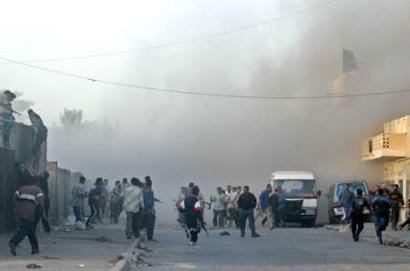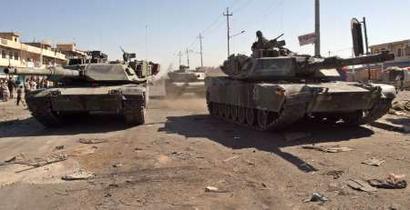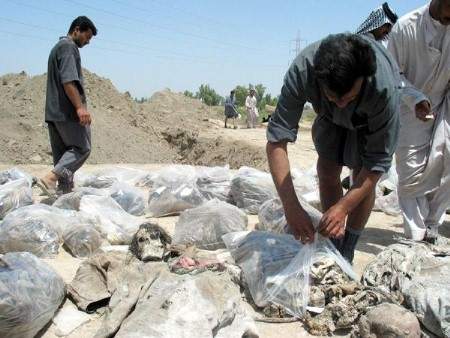From the Open-Publishing Calendar
From the Open-Publishing Newswire
Indybay Feature
Remembering the 1991 Shiite Uprising In Iraq: Will The Results Be The Same This Time?
Will the US respond to a Shiite uprising the same way Saddam did? The US won't go in and openly massacre the population in the same way, but there are likely to be similarities. The US already tortures suspected "terrorists" and since Shiite fundamentalists are now being classified as "terrorists" ,the dehumanization process isn't much different from that encouraged by Saddam. Dozens died in yesterdays small uprising by a cleric with only marginal popularity. How many will die when there is a more widespread uprising? If the US attempts to arrest al-Sadr and ends up entering and/or damaging Shiite holy sites, thousands will attack US troops in dozens of cities. When the US responds by attempting to "passify" the South (as they are talking of "passifying Falluja today), images of helicopter gunships opening fire on crowds of Shiite protesters is likely to bring back some disturbing memories of 1991.

Iraqis scramble for cover after a U.S. tank fired on them as clashes broke out with U.S. forces in the impoverished Baghdad suburb of Al Sadr City April 4, 2004. REUTERS/Ceerwan Aziz
http://story.news.yahoo.com/news?tmpl=story&u=/040404/ids_photos_wl/r3428689402.jpg
[The Shia] had claim to have suffered most under Saddam Hussein - killed in their thousands during the failed uprising of 1991, and stopped on pain of death from practising their most sacred rituals.
Now, for the first time in Iraq's history as a nation state, the Shia have the chance of winning the political power to match their majority in the population.
Ayatollah Sistani has been calling peaceful resistance
And yet, for a coalition which already has enemies enough in Iraq, a new front is opening up, with helicopter gunships over the Shia slums of Baghdad, and automatic fire in the holy city of Najaf, a place which had been calm for almost the whole of the past 12 months.
http://news.bbc.co.uk/2/hi/middle_east/3602151.stm
In the first Gulf War, the first President Bush told the Iraqi people to "take matters into their own hands and force Saddam Hussein, the dictator, to step aside." Then when the people of Basra took his advice and rose up, they found they had no support from the Coalition, which withdrew and left them to the tender mercies of that same dictator.
http://www.abc.net.au/pm/content/2003/s817231.htm
The Ghosts of 1991
Just 12 years ago, the Shiite Muslims who constitute a majority in Iraq and in the city of Baghdad were betrayed by the United States -- an act that may have cost them as many as 100,000 lives. That recent history -- of which the Shiites are understandably a good deal less forgetful than we -- explains why the Shiites in the south initially greeted invading American and British forces with a good deal more reserve than expected. And as the continuing turmoil in southern towns and cities makes clear, building a democratic state in Iraq over the long term will depend to a large degree on how strong and lasting a trust we can build among these people.
The spontaneous Shiite uprising of 1991 consumed the southern part of Iraq right up to the approaches to Baghdad. Rebels came to U.S. troops, who were then deployed in the Euphrates Valley, begging for U.S. intervention. The Shiite political parties sent emissaries to the few Americans who would see them. To this day, I am haunted by the desperation in the appeals made to me by one group, as they realized time was running out for their countrymen.
Many of the problems we face now and in the future with Shiites likely have to do with the way the first Bush administration responded to those appeals. On Feb. 15, 1991, President George H.W. Bush called on the Iraqi military and people to overthrow Saddam Hussein. On March 3, an Iraqi tank commander returning from Kuwait fired a shell through one of the portraits of Hussein in Basra's main square, igniting the southern uprising. A week later, Kurdish rebels ended Hussein's control over much of the north.
But although Bush had called for the rebellion, his administration was caught unprepared when it happened. The administration knew little about those in the Iraqi opposition because, as a matter of policy, it refused to talk to them. Policymakers tended to see Iraq's main ethnic groups in caricature: The Shiites were feared as pro-Iranian and the Kurds as anti-Turkish. Indeed, the U.S. administration seemed to prefer the continuation of the Baath regime (albeit without Hussein) to the success of the rebellion. As one National Security Council official told me at the time: "Our policy is to get rid of Saddam, not his regime."
The practical expression of this policy came in the decisions made by the military on the ground. U.S. commanders spurned the rebels' plea for help. The United States allowed Iraq to send Republican Guard units into southern cities and to fly helicopter gunships. (This in spite of a ban on flights, articulated by Gen. Norman Schwarzkopf with considerable swagger: "You fly, you die.") The consequences were devastating. Hussein's forces leveled the historical centers of the Shiite towns, bombarded sacred Shiite shrines and executed thousands on the spot. By some estimates, 100,000 people died in reprisal killings between March and September. Many of these atrocities were committed in proximity to American troops, who were under orders not to intervene.
In recent years Baghdad has shortchanged the south in the distribution of food and medicine, contributing to severe malnutrition among vulnerable populations. Some 100 Shiite clerics have been murdered, including four senior ayatollahs. Draining the marshes displaced 400,000 Marsh Arabs, destroying a culture that is one of the world's oldest, as well as causing immeasurable ecological damage.
http://www.washingtonpost.com/ac2/wp-dyn/A10874-2003Apr11?language=printer
http://story.news.yahoo.com/news?tmpl=story&u=/040404/ids_photos_wl/r3428689402.jpg
[The Shia] had claim to have suffered most under Saddam Hussein - killed in their thousands during the failed uprising of 1991, and stopped on pain of death from practising their most sacred rituals.
Now, for the first time in Iraq's history as a nation state, the Shia have the chance of winning the political power to match their majority in the population.
Ayatollah Sistani has been calling peaceful resistance
And yet, for a coalition which already has enemies enough in Iraq, a new front is opening up, with helicopter gunships over the Shia slums of Baghdad, and automatic fire in the holy city of Najaf, a place which had been calm for almost the whole of the past 12 months.
http://news.bbc.co.uk/2/hi/middle_east/3602151.stm
In the first Gulf War, the first President Bush told the Iraqi people to "take matters into their own hands and force Saddam Hussein, the dictator, to step aside." Then when the people of Basra took his advice and rose up, they found they had no support from the Coalition, which withdrew and left them to the tender mercies of that same dictator.
http://www.abc.net.au/pm/content/2003/s817231.htm
The Ghosts of 1991
Just 12 years ago, the Shiite Muslims who constitute a majority in Iraq and in the city of Baghdad were betrayed by the United States -- an act that may have cost them as many as 100,000 lives. That recent history -- of which the Shiites are understandably a good deal less forgetful than we -- explains why the Shiites in the south initially greeted invading American and British forces with a good deal more reserve than expected. And as the continuing turmoil in southern towns and cities makes clear, building a democratic state in Iraq over the long term will depend to a large degree on how strong and lasting a trust we can build among these people.
The spontaneous Shiite uprising of 1991 consumed the southern part of Iraq right up to the approaches to Baghdad. Rebels came to U.S. troops, who were then deployed in the Euphrates Valley, begging for U.S. intervention. The Shiite political parties sent emissaries to the few Americans who would see them. To this day, I am haunted by the desperation in the appeals made to me by one group, as they realized time was running out for their countrymen.
Many of the problems we face now and in the future with Shiites likely have to do with the way the first Bush administration responded to those appeals. On Feb. 15, 1991, President George H.W. Bush called on the Iraqi military and people to overthrow Saddam Hussein. On March 3, an Iraqi tank commander returning from Kuwait fired a shell through one of the portraits of Hussein in Basra's main square, igniting the southern uprising. A week later, Kurdish rebels ended Hussein's control over much of the north.
But although Bush had called for the rebellion, his administration was caught unprepared when it happened. The administration knew little about those in the Iraqi opposition because, as a matter of policy, it refused to talk to them. Policymakers tended to see Iraq's main ethnic groups in caricature: The Shiites were feared as pro-Iranian and the Kurds as anti-Turkish. Indeed, the U.S. administration seemed to prefer the continuation of the Baath regime (albeit without Hussein) to the success of the rebellion. As one National Security Council official told me at the time: "Our policy is to get rid of Saddam, not his regime."
The practical expression of this policy came in the decisions made by the military on the ground. U.S. commanders spurned the rebels' plea for help. The United States allowed Iraq to send Republican Guard units into southern cities and to fly helicopter gunships. (This in spite of a ban on flights, articulated by Gen. Norman Schwarzkopf with considerable swagger: "You fly, you die.") The consequences were devastating. Hussein's forces leveled the historical centers of the Shiite towns, bombarded sacred Shiite shrines and executed thousands on the spot. By some estimates, 100,000 people died in reprisal killings between March and September. Many of these atrocities were committed in proximity to American troops, who were under orders not to intervene.
In recent years Baghdad has shortchanged the south in the distribution of food and medicine, contributing to severe malnutrition among vulnerable populations. Some 100 Shiite clerics have been murdered, including four senior ayatollahs. Draining the marshes displaced 400,000 Marsh Arabs, destroying a culture that is one of the world's oldest, as well as causing immeasurable ecological damage.
http://www.washingtonpost.com/ac2/wp-dyn/A10874-2003Apr11?language=printer


Add Your Comments
We are 100% volunteer and depend on your participation to sustain our efforts!
Get Involved
If you'd like to help with maintaining or developing the website, contact us.
Publish
Publish your stories and upcoming events on Indybay.
Topics
More
Search Indybay's Archives
Advanced Search
►
▼
IMC Network


